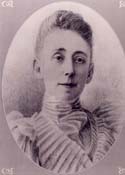 This Goodly Land
This Goodly Land
Howard Weeden (July 6, 1846–April 12, 1905)

Other Names Used
- Maria Howard Weeden: full name
- Flake White: pen name
Alabama Connections
- Huntsville, Madison County: birthplace, childhood residence, adult residence
Selected Works
- Weeden, Howard. Shadows on the Wall. New York: M. Stoltz & Company, 1898. Rpt. Freeport, N.Y.: Books for Libraries Press, 1971. An online version of Shadows on the Wall is available from Google Book Search.
- Weeden, Howard. Bandanna Ballads, Including "Shadows on the Wall": Verses and Pictures. New York: Doubleday & McClure Company, 1899. An online version of Bandanna Ballads is available from Google Book Search.
- Weeden, Howard. Songs of the Old South: Verses and Drawings. New York: Doubleday, Page, 1900. An online version of Songs of the Old South is available from Internet Archive's American Libraries.
- Weeden, Howard. Old Voices. New York: Doubleday, Page & Company, 1904. An online version of Old Voices is available from Internet Archive's American Libraries.
- Weeden, Howard. Lost Writings of Howard Weeden as "Flake White”. Ed. Sarah Huff Fisk and Linda Wright Riley. Huntsville: Big Spring Press, 2005.
Biographical Information
Howard Weeden was born in Huntsville, Ala., several months after the death of her father, a wealthy physician. Weeden demonstrated artistic talent early and was taking lessons from portraitist William Frye before the age of ten. In 1862, Union army forces seized Huntsville. The Weeden home was taken over for Union officers' housing, and the family went to Tuskegee, Ala., to live with relatives. While they were there, Weeden attended Tuskegee Female College (now Huntingdon College in Montgomery). After the war ended, the family returned to Huntsville but suffered financial difficulties. In 1866, Weeden began publishing short stories and essays under the pen name, “Flake White.” She continued to publish under this name for thirty years. Many of these pieces were published in The Christian Observer, a Presbyterian Church periodical. In addition to her publishing, Weeden gave art classes to local girls and painted and sold greeting cards, sometimes composing verses to go in them.
Weeden’s first portrait of a former slave was painted to illustrate a poem by Sarah Pratt McLean, “De Massa ob de Sheepfol’.” She began painting the black servants of her family and friends and sometimes wrote verses to accompany the portraits. In 1893, Weeden went to the Columbian Exhibition in Chicago to exhibit some of her work. Her friend Elizabeth Price also exhibited some of Weeden's work in a Nashville music studio and at a Berlin gallery. A private publisher arranged to produce a booklet of her paintings and their accompanying poems. Shadows on the Wall was published in 1898. Soon after a second edition was printed, the press burned, destroying the book’s plates. An expanded version was published as Bandanna Ballads by Doubleday & McClure Company in 1899. Weeden’s health was precarious all her life, and at some point she contracted tuberculosis. Her condition rapidly deteriorated, and she was only able to produce two more books before her death in 1905.
Interests and Themes
Howard Weeden’s Flake White stories and most of her essays have religious subjects and are intended to “uplift” the reader. The poems she composed to accompany her paintings of former slaves are written in black dialect and express nostalgia for the period before the Civil War.
For More Information
Please check your local library for these materials. If items are not available locally, your librarian can help you borrow them through the InterLibrary Loan program. Your librarian can also help you find other information about this author.
There may be more information available through the databases in the Alabama Virtual Library. If you are an Alabama citizen, AVL can be used at your public library or school library media center. You can also get a username and password from your librarian to use AVL at home.
Reference Books
- Patrick, Pamela Cowie. Maria Howard Weeden: The Gentle Artist. Illus. Margo Williams. Huntsville: Writers Consortium Books, 1989. For younger readers.
- Roberts, Frances C., and Sarah Huff Fisk. Shadows on the Wall: The Life and Works of Howard Weeden. Northport, Ala.: Colonial Press, 1962.
Reference Articles
- Cornelius, Kay. "The Art of Howard Weeden". Alabama Heritage 40. (1996): 18-27.
- Fisk, Sarah Huff. "Howard Weeden, Artist and Poet". Alabama Review 14.2. (1961): 124-137.
Reference Book Chapters and Encyclopedia Entries
- Williams, Benjamin Buford. "Poetry and Drama"; A Literary History of Alabama: The Nineteenth Century. Rutherford, N.J.: Fairleigh Dickinson University Press, . 133-134.
Location of Papers
- Huntsville Public Library
Image courtesy of the Alabama Women's Hall of Fame.
Last updated on May 30, 2008.